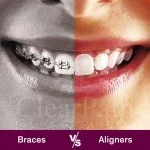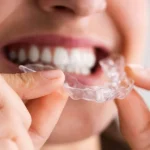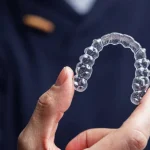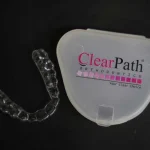Introduction to Orthodontic Treatment
Orthodontic treatment involves the use of devices such as braces to correct the alignment of teeth and improve dental health.
While this treatment is highly effective, it can cause discomfort, particularly when braces are newly fitted or adjusted. However, Clearpath Aligners, also known as Invisible Braces, are designed to minimize this inconvenience.
Despite this, users may still experience some discomfort, which can be alleviated with the use of soothing balms.
The Role of Orthodontic Wax in Enhancing Comfort
Orthodontic wax plays a crucial role in providing relief and enhancing comfort during orthodontic treatment.
It is a soft material that can be applied to the parts of the braces causing irritation, thereby creating a smooth surface that prevents further discomfort.
This can be particularly beneficial during the initial adjustment period to new braces or after an adjustment.
Remember, while orthodontic wax can provide temporary relief, it’s not a substitute for regular check-ups with your orthodontist to ensure your treatment is progressing as it should.
What is Orthodontic Wax

Orthodontic wax is a dental aid used by individuals who are undergoing orthodontic treatment. It is typically composed of safe and edible materials, often including beeswax or similar substances.
This ensures that even if some wax is accidentally ingested, it will not pose a health risk.
How it Works
The primary function of orthodontic wax is to create a barrier between the orthodontic appliances (like braces or aligners) and the soft tissues of the mouth, including the gums, inner cheeks, and lips.
By doing so, it helps to prevent irritation and discomfort that can be caused by the metal parts of the braces or the edges of the aligners. The wax is simply applied to the area causing discomfort, providing immediate relief by smoothing out the rough or sharp edges.
Remember, while orthodontic wax can provide temporary relief, it’s not a substitute for regular check-ups with your orthodontist to ensure your treatment is progressing as it should.
Benefits of Using Orthodontic Wax:

Orthodontic wax offers several benefits that can significantly enhance the comfort of individuals undergoing orthodontic treatment. Here are some key benefits:
Soothes Irritation and Enhances Comfort
One of the primary benefits of orthodontic wax is its ability to soothe irritation and enhance comfort.
The brackets, wires, and sharp edges of aligners can cause discomfort and irritation in the mouth. By applying orthodontic wax to these areas, the discomfort can be alleviated, making the orthodontic treatment process more comfortable.
Prevents Food from Getting Stuck
Orthodontic wax can also help prevent food particles from getting stuck in braces or aligners. By creating a smoother surface, the wax reduces the chances of food particles getting trapped, which could lead to further discomfort or damage.
Protects Cheeks and Lips
Orthodontic wax can act as a protective layer against cuts and abrasions caused by braces or aligners. By applying the wax to the areas of the braces or aligners that come into contact with the cheeks and lips, it can help prevent injuries to these sensitive areas.
Remember, while orthodontic wax can provide temporary relief, it’s not a substitute for regular check-ups with your orthodontist to ensure your treatment is progressing as it should.
When to Use Orthodontic Wax

Orthodontic wax can be used at various stages of orthodontic treatment and for different reasons.
Here are some key instances when it can be particularly beneficial:
| When to Use Orthodontic Wax | Description |
| New Aligners / Adjustments | The initial adjustment period when new aligners are fitted or when braces are tightened can be uncomfortable. During this time, orthodontic wax can be extremely helpful. By applying the wax to the areas causing discomfort, you can alleviate the irritation and make the adjustment process more comfortable. |
| Sharp Edges or Protruding Wires | If you notice any sharp edges or protruding wires on your braces or aligners, orthodontic wax can be used to cover these areas. This will create a smoother surface, reducing the risk of cuts or abrasions in your mouth. |
| Gum Irritation | Orthodontic treatment involves applying pressure to the teeth to gradually move them into the desired position. This necessary pressure can sometimes lead to gum irritation. In such cases, orthodontic wax can be applied to the area causing discomfort, providing a soothing effect and reducing irritation. |
Remember, while orthodontic wax can provide temporary relief, it’s not a substitute for regular check-ups with your orthodontist to ensure your treatment is progressing as it should.
How to Choose Orthodontic Wax

Choosing and applying orthodontic wax involves a few simple steps. Here’s a guide on how to do it:
Preparation
Before applying the wax, there are a few preparatory steps to ensure the process is hygienic and effective:
| Wax Preparation | Description |
| Handwashing | It’s important to wash your hands thoroughly with soap and water before handling orthodontic wax. This helps to prevent the introduction of bacteria into your mouth. |
| Brushing | For added hygiene, it’s recommended to brush your teeth or rinse your mouth before applying the wax. This ensures that the area where the wax will be applied is clean. |
| Drying | Dry the area around your braces or aligners with a clean tissue before applying the wax. This helps the wax adhere better to the appliance. |
Wax Application
Once you’ve prepared, you can proceed to apply the wax:
| Application Steps | Description |
| Amount | Take a small pea-sized piece of wax and soften it between your fingers. This makes it easier to apply. |
| Shaping | Shape the softened wax into a small ball or roll. This shape is easier to handle and apply to the braces or aligners. |
| Placement | Gently press the wax onto the irritated area, ensuring complete coverage. The wax should stick to the braces or aligners and not the soft tissue. |
| Mirror Check | Use a mirror to confirm proper placement and coverage of the wax. This helps to ensure that the wax is effectively protecting the area causing discomfort. |
Remember, while orthodontic wax can provide temporary relief, it’s not a substitute for regular check-ups with your orthodontist to ensure your treatment is progressing as it should.
Additional points to Consider
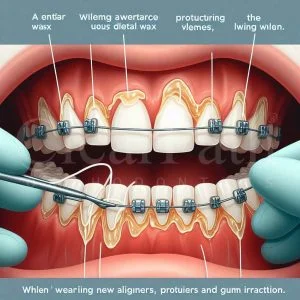
Here are some additional points to consider when using orthodontic wax:
| Additional Considerations | Description |
| Replacement | It’s recommended to replace the orthodontic wax at least once a day or when needed, especially if it becomes dislodged or dirty. This ensures that the wax remains effective and hygienic. |
| Eating and Drinking | Before eating or drinking, it’s advisable to remove the orthodontic wax. This prevents the wax from being swallowed or potentially dislodged while eating. |
| Not a Substitute for Good Oral Hygiene | While orthodontic wax can provide temporary relief from discomfort, it’s important to remember that it’s not a replacement for proper oral hygiene practices. Regular brushing and flossing are still necessary to maintain good oral health during orthodontic treatment. |
| Consult Your Dentist | If you have any concerns or if the discomfort persists despite using orthodontic wax, it’s encouraged to consult your dentist or orthodontist. They can check your braces or aligners and provide appropriate advice or treatment. |
Remember, while orthodontic wax can provide temporary relief, it’s not a substitute for regular check-ups with your orthodontist to ensure your treatment is progressing as it should.
Orthodontic Wax in Pakistan

Orthodontic wax can be especially helpful when you’re adjusting to new braces or after an adjustment when the braces might feel particularly uncomfortable. It’s also useful for aligner wearers who might experience discomfort from the aligner edges or attachments.
In Pakistan, orthodontic wax is readily available and can be purchased online or from dental supply stores. The price can vary, but it’s generally affordable.
Please note that if the discomfort from your braces or aligners doesn’t gradually dissipate after a few days of using orthodontic wax, it’s recommended to contact your orthodontist or aligner provider. They can check if there’s an issue with your appliance that needs to be addressed.
Remember, while orthodontic wax can provide temporary relief, it’s not a substitute for regular check-ups with your orthodontist to ensure your treatment is progressing as it should.
Frequently Asked Questions (FAQs)
Here are some common questions about orthodontic wax:
Q. Is it safe to eat orthodontic wax?
Ans. While it’s not recommended to intentionally eat orthodontic wax, it’s generally made from safe, non-toxic materials. If you accidentally ingest a small amount, it should not cause harm. However, it’s best to avoid eating large amounts.
Q. What can I use instead of orthodontic wax?
Ans. If you don’t have orthodontic wax on hand, there are a few alternatives you can use temporarily. These include silicone-based products, dental gels, or even a piece of soft bread or chewing gum in a pinch. However, these are temporary solutions and it’s recommended to use orthodontic wax as soon as possible.
Q. Does orthodontic wax dissolve?
Ans. Orthodontic wax does not dissolve in the mouth. It stays in place to provide a barrier between your braces and the soft tissues of your mouth. However, it can wear down over time and may need to be replaced regularly.
Q. Can I sleep with orthodontic wax?
Ans. Yes, you can sleep with orthodontic wax applied to your braces. In fact, it can be particularly helpful to apply it before bed if your braces are causing discomfort.
Q. Can I eat with orthodontic wax?
Ans. It’s recommended to remove orthodontic wax before eating. This is because it can become dislodged during eating, and food particles can get stuck in it.
Q. Does orthodontic wax expire?
Ans. Orthodontic wax does not typically have an expiration date, but it’s best to keep it stored in a cool, dry place to maintain its effectiveness. If the wax changes color, texture, or smell, it’s best to replace it.
Q. Can I reuse orthodontic wax?
Ans. It’s not recommended to reuse orthodontic wax. Once it’s been applied and removed, it’s best to discard it and use a fresh piece next time.
Orthodontic wax plays a crucial role in enhancing comfort during orthodontic treatment. It provides a protective barrier between the braces or aligners and the soft tissues of the mouth, preventing irritation and discomfort.
By using orthodontic wax properly, you can ensure a smoother and more comfortable orthodontic treatment experience.
If you’re considering invisible braces to beautify your smile, please fill out our contact form. We provide FDA-certified invisible braces in Pakistan and abroad. Our customer service team will assist you with the next steps while ensuring your privacy.

